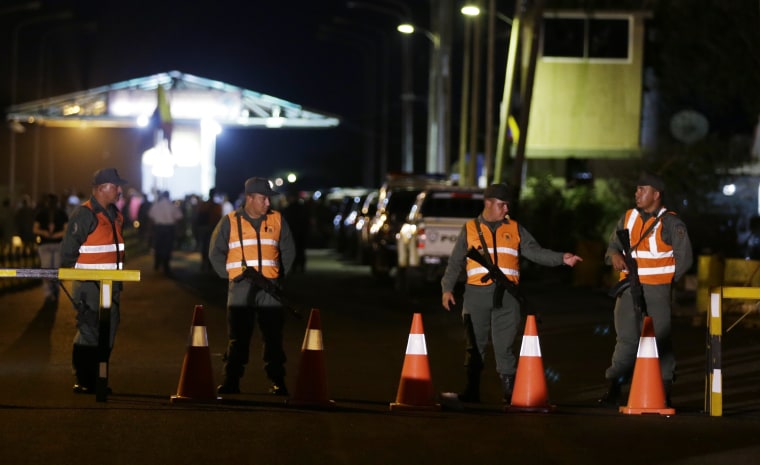Workers, vacationers and members of a nomadic indigenous community have been left stranded following Venezuela's sudden decision to close another major border crossing with Colombia. The move has further escalated tensions between the neighboring countries.
President Nicolas Maduro ordered the main crossing in Venezuela's biggest state closed Monday night as part of a two week-old anti-smuggling offensive.
Shelters and human rights groups in Colombia are struggling to absorb thousands of migrants who have fled their Venezuelan homes.

The crackdown by Venezuelan authorities had targeted Tachira state across the border from Cucuta, a Boston-size city in Colombia that has long relied on smuggled gas, food and other goods purchased in Venezuela at bargain-basement subsidized prices.
But in moving the focus north to Zulia state, Maduro is encroaching on a more vital economic hub around the oil metropolis of Maracaibo, Venezuela's second-largest city.
In the space of two weeks, Maduro has closed six crossings and deported about 1,500 Colombians without legal status, blaming the migrants for a surge in crime and contraband along Venezuela's western edge.
Nearly 20,000 more Colombians, some of whom have lived in Venezuela for years, have returned voluntarily, fearing reprisals as reports spread about security forces uprooting migrants and marking their homes for demolition.
Colombia President Juan Manuel Santos said Tuesday that he would not be provoked. "We will not respond to insults," he said.
Maduro could also face resistance from hundreds of thousands of Wayuu Indians settled on either side of the border who don't recognize the international division.
Venezuelan authorities said they will respect the Wayuu's traditional nomadism and increase education grant programs even as an additional 3,000 troops are deployed to Zulia.
"They are masters of their own land," said Venezuelan Vice President Jorge Arreaza. "They will be free to move back and forth, just not with contraband."
But some members of the indigenous community said they had been blocked at checkpoints and would have to try to sneak across the border. Leaders were already publicly denouncing the closure by Tuesday afternoon.
"I don't think this is what we deserve, because all we do is take care of our land," said Wayuu activist Ricardo Fernandez.
Maduro said more border crossings could be closed in the coming days. In the same address, he offered to take in 20,000 refugees from the civil war in Syria.
In recent days Colombia has stepped up a diplomatic campaign against the border offensive.
Foreign Minister Maria Angela Holguin met with the United Nations' High Commissioner for Human Rights in Geneva on Monday to denounce what she called a deliberate campaign of scapegoating Colombians for Venezuela's deep-seated economic problems, which include widespread shortages and triple-digit inflation.
On Wednesday, she travels to New York to meet with U.N. Secretary-General Ban Ki-moon, who last week discussed the crisis with Maduro in China.
Maduro says he is the target of U.S.-backed conservatives in Colombia bent on toppling his socialist government while turning a blind eye to decades of political and drug-fueled violence in Colombia that has made Venezuela a haven for many of its neighbor's poor.
He repeated an offer to meet with Santos to resolve the crisis.
--Associated Press